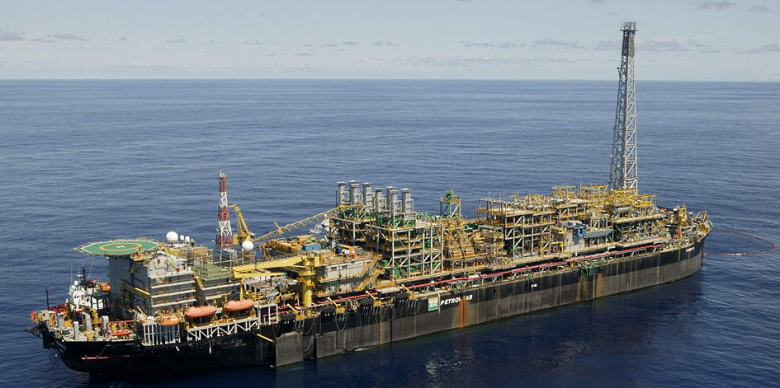
BRAZIL REGAIN MARKET

PLATTS- Petrobras' more-aggressive pricing policy for diesel and gasoline is helping the Brazilian state-led oil producer and refiner to regain market share it lost to cheap imports last year, especially in diesel sales, the company's director for refining, natural gas and energy said Thursday.
"The increase in competition induced new practices in the market that resulted in imports returning to normal," Petrobras' Jorge Celestino said during a presentation of the company's 2017 financial results.
A surge in fuel imports, especially diesel and gasoline, in the first half of 2017 forced Petrobras to tweak its domestic policy to adjust prices for transportation fuels on a near-daily basis in July, Celestino noted. In addition, Petrobras in December modernized sales contracts with distributors and optimized logistics to reduce costs and increase margins, he said.
The measures are working, according to Petrobras CFO Ivan Monteiro. "We've had a recovery in market share already visible in 2018 with the measures implemented," he said.
According to Celestino, diesel imports started 2017 at 730,000 cubic meters in January before peaking at 1.56 billion cubic meters in November. That reduced Petrobras' share of the diesel market to an average of 74% in 2017, compared with 83% in 2016.
Petrobras' recent moves, however, have brought diesel imports down to about 680,000 cubic meters in February, which has in turn fueled a rebound in the company's diesel market share to 79%, Celestino said.
Diesel is Brazil's most-widely consumed oil product, with gasoline a distant second, according to Brazil's National Petroleum Agency, or ANP. Brazil imports about 20% of its diesel needs and about 15% of gasoline demand.
Brazil's gasoline market, meanwhile, was more mixed, according to Celestino. Gasoline imports remained relatively stable throughout the year, starting 2017 at 320,000 cubic meters in January and falling to 300,000 cubic meters in November, he said. Petrobras' gasoline market share tumbled to 83% in 2017 compared with 90% in 2016.
Imports surged to about 360,000 cubic meters in February, which undercut the company's market share to about 77% in February, Celestino said.
"We've already started to recover market share," he said. "Our competitive position shows that we're once again conquering the domestic market and these operational results in February and March are translating into higher profitability for the company."
Petrobras continued to run its refineries at about 77% of installed capacity, with most of the output earmarked for high-margin products such as diesel, gasoline and jet fuel. Celestino indicated that Petrobras doesn't have any plans to increase output at its refineries, instead focusing on profitability in the product mix.
Output from Petrobras's refineries fell to 1.800 million b/d in 2017 compared with 1.887 million b/d in 2016, Petrobras said. Diesel output slid 10.7% year on year to 692,000 b/d, while gasoline production dipped 1.8% to 439,000 b/d.
Brazil's bumbling economy should also help Petrobras' results, with Latin America's largest economy finally emerging from nearly three years of recession to post 1% growth in 2017. Diesel and gasoline consumption typically tracks the direction of GDP, which is expected to expand by about 3.5% in 2018.
Petrobras' oil-product sales fell to 1.94 million b/d in 2017 versus 2.064 million b/d in 2016, the company said. Diesel sales dropped 8.1% year on year to 717,000 b/d, while gasoline sales sank 4.4% on year to 521,000 b/d.
-----
Erlier:

2018, January, 4, 12:15:00
U.S. WANT PETROBRAS: $3 BLNPETROBRAS - The agreement does not constitute any admission of wrongdoing or misconduct by Petrobras. In the agreement, Petrobras expressly denies liability. This reflects its status as a victim of the acts uncovered by Operation Car Wash, as recognized by Brazilian authorities including the Brazilian Supreme Court. As a victim of the scheme, Petrobras has already recovered R$1.475 billion in restitution in Brazil and will continue to pursue all available legal remedies from culpable companies and individuals.
|

2017, December, 18, 12:15:00
EXXON - PETROBRAS ALLIANCEPetrobras and ExxonMobil signed a memorandum of understanding regarding a strategic alliance to jointly identify and evaluate potential business opportunities.
|

2017, December, 15, 13:00:00
BRAZILIAN OIL UP TO 3.3 MBDEIA - Brazil has produced 3.3 million barrels per day (b/d) of petroleum and other liquids so far in 2017, according to data through August, up from 3.2 million b/d in 2016, making it the ninth-largest producer of petroleum and other liquids in the world. Production of crude oil in Brazil increased in recent years as producers targeted large, offshore, pre-salt oil deposits. Brazil’s pre-salt oil production in 2016 reached a record 1.02 million b/d, surpassing the 2015 production level by 33%.
|

2017, November, 29, 09:35:00
BRAZIL IN MOVEMENTOGJ - Total SA announced Nov. 27 that the Petroleo Brasileiro SA (Petrobras)-led Libra consortium has brought production on stream in ultradeep waters 180 km offshore Rio de Janeiro in Brazil’s presalt Santos basin.
|

2017, November, 15, 12:32:00
PETROBRAS NET INCOME R$ 5,031 MLNPETROBRAS - Net Income of R$ 5,031 million in 9M-2017, compared to a loss of R$ 17,334 million in 9M-2016.
|

2017, August, 12, 12:26:00
PETROBRAS NET INCOME R$ 4,765 MLNPETROBRAS - Net Income of R$ 4,765 million in 1H-2017, compared to a loss of R$ 876 million in 1H-2016
|

2017, July, 17, 13:40:00
IMF WANT BRAZILDirectors observed that the financial sector has remained sound despite the severe stresses. To make the system more robust, they encouraged actions to further strengthen financial safety nets through enhanced monitoring and an improved crisis management framework. Directors underscored the need for continued vigilance and close monitoring of the health of the corporate sector and its impact on the banking system. |




